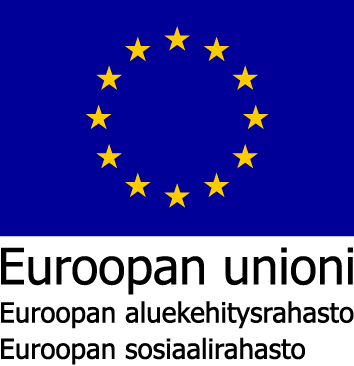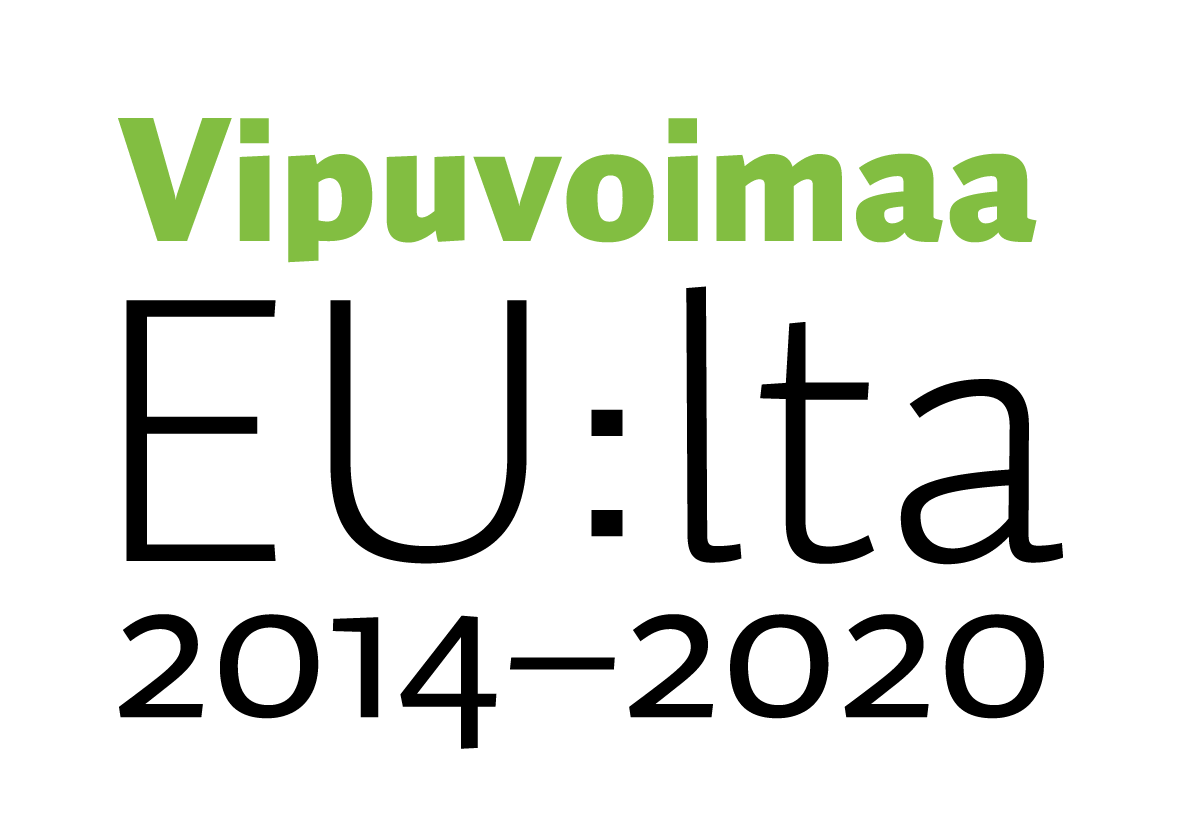

 |
 |
Hankekoodi: S22615
Hankkeen nimi: Digiosaamisella työelämään
Toimintalinja: 9. REACT-EU:n ESR-toimenpiteet
Erityistavoite: 12.3. Digitaalisten taitojen parantaminen
Suunnitelman mukainen toteutusaika: Alkaa 1.9.2021 ja päättyy 31.10.2023
Toiminnan tila: Toiminta päättynyt
Vastuuviranomainen: Pohjois-Pohjanmaan elinkeino-, liikenne- ja ympäristökeskus
Hakijan virallinen nimi: Hengitysliitto ry
Organisaatiotyyppi: Muu järjestö tai yhdistys
Y-tunnus: 0201472-1
Jakeluosoite: Ruutihaantie 12, 84100 Ylivieska
Puhelinnumero: 0408614835
Postinumero: 84100
Postitoimipaikka: Ylivieska
WWW-osoite: http://www.sytyke.fi
Hankkeen yhteyshenkilön nimi: Leppiniemi Anne Mari
Yhteyshenkilön asema hakijaorganisaatiossa: Johtaja
Yhteyshenkilön sähköpostisoite: anne.leppiniemi(at)sytyke.fi
Yhteyshenkilön puhelinnumero: 0408614835
Hakijoiden lukumäärä tai tuen siirto -menettely:
Sytykkeen ja Centria AMK:n Digiosaamisella työelämään hanke toteutetaan 1.9.2021 – 31.10.2023. Kohderyhmänä ovat Ylivieskan ja Nivala-Haapajärven seutukuntien työttömät työnhakijat, joiden työttömyys on pitkittynyt ja jotka tarvitsevat opetusta perusdigitaitoihin, työttömät työnhakijat, joilla on media- tai digialan osaamista, mutta eivät osaa hyödyntää sitä työelämässä tai jatkosuunnitelmien teossa sekä media- ja digialojen opiskelijat, jotka tarvitsevat tuetumpaa oppimisympäristöä.
Digitaidot ovat tulleet yhä keskeisemmäksi työelämässä vaadittavaksi taidoksi. Tarvetta onkin kaventaa työttömien hyvinvointi- ja sivistyseroja sekä vahvistaa heidän työllistymismahdollisuuksiaan tarjoamalla digiosaamisen kehittämistä. Tarvetta on myös luoda sellainen digipajan oppimisympäristö, joka tukee digitalisaatioalojen opiskelijoiden opiskeluiden suorittamista ja valmistuneiden työllistymistä.
Hankkeen asiakkaalle suunnitellaan yksilöllinen valmennusjakso ja aloitusvaiheessa sovitaan, mitä hankkeen toimenpiteitä hyödynnetään. Toimenpiteitä asiakkaille ovat digipajan valmennus, yksilövalmennus, ryhmätoiminnot ja koulutukset. Valmennuksen päätösvaiheessa tehdään ammatillinen jatkosuunnitelma. Hankkeeseen ohjaamisessa ja digipajan valmennuksessa tehdään tiivistä yhteistyötä Centria AMK:n, Jokilaaksojen koulutuskuntayhtymä Jedun, TE-palveluiden ja Jokilaaksojen työllisyyden kuntakokeilun kanssa. Koulutusyhteistyötä tehdään lisäksi Centria AMK:n kanssa.
Tavoitteena on parantaa osallistujien digitaalisia taitoja, löytää osallistujille realistiset ammatilliset jatkosuunnitelmat, kehittää osallistujien vuorovaikutustaitoja, ennaltaehkäistä digipelaamiseen liittyviä ongelmia, luoda yhteistyömalli media- ja digitalisaatioalojen oppilaitosten kanssa sekä tuotteistaa Sytykkeen digipajaympäristö. Tuloksena on toimintamalli digipajan valmennukseen, jonka tuloksena osallistujan digitaaliset taidot paranevat, kehittyvät ja kasvavat. Hankkeen tuloksena osallistuja saa tarvitsemaansa lisäosaamista, mikä auttaa häntä jatkossa työllistymään, suorittamaan opintoja tai käyttämään oppimaansa arjessa ja työelämässä. Pitkän aikavälin tuloksena on työttömien työllistyminen ja digitalisaatioalojen osaajien työllisyysasteen paraneminen.
Tuloksena on toimintamalli työpajan digipajan valmennuksen ja oppilaitosten kesken. Mallin tuloksena saadaan luotua tuettu oppimisympäristö digitalisaatioalojen opiskelijoille, jotka tarvitsevat vahvempaa ohjausta opinnoilleen. Lisäksi pilotoidaan työpajan ja oppilaitoksen yhteistyömallia nuorille, jotka kuuluvat oppivelvollisuusiän piiriin ja kaipaavat tuettua oppimisympäristöä.
Hankkeeseen arvioidaan osallistuvan vuosittain 30 asiakasta. Toiminnan tuloksena osallistujan osallisuus kohentuu, hän vahvistuu sosiaalisesti ja oppii sellaisia taitoja, että hänen mahdollisuutensa työllistyä lisääntyvät. Tuotoksena on kohderyhmän tarpeisiin räätälöidyt koulutuspaketit, joiden tuloksena osallistuja saa lisä- ja päivitysosaamista.
Hankkeen kohderyhmään kuuluvat Ylivieskan ja Nivala-Haapajärven seutukuntien alueella asuvat:
1. Työttömät työnhakijat, joiden työttömyys on pitkittynyt ja, jotka tarvitsevat opetusta perusdigitaitoihin.
2. Työttömät työnhakijat, joilla on media- tai digialan osaamista, mutta eivät osaa hyödyntää sitä työelämässä tai jatkosuunnitelmien teossa.
3. Media- ja digialojen opiskelijat, jotka tarvitsevat tuetumpaa oppimisympäristöä.
Työttömät työnhakijat voivat olla hankkeessa valmennuksessa tai osallistua työkokeilu- tai palkkatukisopimuksilla, mikäli heillä on työkokeilu- tai palkkatukioikeus.
Hankkeen välillisiä kohderyhmiä ovat hankkeen toiminta-alueen (Ylivieskan ja Nivala-Haapajärven seutukuntien) media-alan oppilaitokset sekä digi- ja media-alan yrittäjät.
Myönnetty EU- ja valtion rahoitus: 269 657
Toteutunut EU- ja valtion rahoitus: 245 841
Suunniteltu julkinen rahoitus yhteensä: 286 024
Toteutunut julkinen rahoitus yhteensä: 261 749
Maakunnat: Pohjois-Pohjanmaa
Seutukunnat: Nivala-Haapajärven, Ylivieskan
Kunnat: Pyhäjärvi, Oulainen, Sievi, Merijärvi, Reisjärvi, Kalajoki, Alavieska, Ylivieska, Kärsämäki, Nivala, Haapajärvi
Jakeluosoite: Ruutihaantie 12
Postinumero: 84100
Postitoimipaikka: Ylivieska
Suunniteltu: 8
Toteutunut seurantatietojen mukaan: 15
Suunniteltu: 60
| Välitön | Välillinen | |
| Ekologinen kestävyys | ||
| Luonnonvarojen käytön kestävyys | 4 | 2 |
| Hankkeella on vaikutusta luonnonvarojen kestävään käyttöön siten, että edistämällä digitaalisia taitoja, voidaan vähentää paperista asiointia. Vaikutukset ovat kohtalaisia yksittäisen osallistujan kannalta, mutta laajemmassa mittakaavassa vähäiset. | ||
| Ilmastonmuutoksen aiheuttamien riskien vähentäminen | 0 | 2 |
| Digitaalisten taitojen kehittäminen vaikuttaa välillisesti ilmastonmuutoksen aiheuttamien riskien vähentämiseen, kun paperisesta asioinnista siirrytään enemmän sähköiseen asiointiin ja ajoneuvoilla tehtävät matkat vähenevät osallistujien oppiessa hoitamaan viranomaisasiointejaan sähköisesti. | ||
| Kasvillisuus, eliöt ja luonnon monimuotoisuus | 0 | 0 |
| Hankkeella ei ole vaikutusta kasvillisuuteen, eliöihin ja luonnon monimuotoisuuteen. | ||
| Pinta- ja pohjavedet, maaperä sekä ilma (ja kasvihuonekaasujen väheneminen) | 0 | 0 |
| Hankkeella ei ole vaikutuksia pinta- pohjavesiin, maaperään sekä ilmaan. | ||
| Natura 2000 -ohjelman kohteet | 0 | 0 |
| Hankkeella ei ole vaikutuksia Natura 2000 - ohjelman kohteisiin. | ||
| Taloudellinen kestävyys | ||
| Materiaalit ja jätteet | 0 | 0 |
| Hankkeella ei ole vaikutuksia materiaaleihin ja jätteisiin. | ||
| Uusiutuvien energialähteiden käyttö | 0 | 0 |
| Hankkeella ei ole vaikutuksia uusiutuvien energialähteiden käyttöön. | ||
| Paikallisen elinkeinorakenteen kestävä kehittäminen | 5 | 3 |
| Paikallinen elinkeinoelämä voi saada hankkeen kautta osaavaa ja sitoutunutta työvoimaa. Osallistujan työllistyminen vaikuttaa välillisesti hänen lähipiiriinsä ja esim. lasten orientoitumiseen kohti työelämää. | ||
| Aineettomien tuotteiden ja palvelujen kehittäminen | 10 | 10 |
| Hankkeessa kehitetään uudenlaisia toimintamalleja työpajan digipajan valmennukseen ja oppilaitosyhteistyöhön. | ||
| Liikkuminen ja logistiikka | 2 | 0 |
| Hankkeessa rohkaistaan osallistujia etsimään työtä koko työssäkäyntialueeltaan. | ||
| Sosiaalinen ja kulttuurinen kestävyys sekä yhdenvertaisuus | ||
| Hyvinvoinnin edistäminen | 8 | 4 |
| Hankkeessa kiinnitetään huomiota osallistujien hyvinvointiin, tuetaan osallistujien sosiaalista vahvistumista sekä itsetuntemusta. Osaamisen kehittäminen luo osaltaan hyvinvointia osallistujalle. Osallistujan hyvinvoinnin edistämisellä on välillisiä vaikutuksia yhteiskunnallisesti. | ||
| Tasa-arvon edistäminen | 8 | 6 |
| Hanke keskittyy heikossa työmarkkina-asemassa olevien työttömien työllisyysvalmiuksien tukemiseen sekä tukea tarvitsevien opiskelijoiden tukemiseen. Yhtenä osa-alueena valmennuksessa on saavutettavuus, mikä on yksi tärkeä tasa-arvon edistämisen keino. | ||
| Yhteiskunnallinen ja kulttuurinen yhdenvertaisuus | 8 | 5 |
| Hankkeessa tavoitteena on realististen ammatillisten suunnitelmien laatiminen. Niiden myötä osallistujat pääsevät osalliseksi koulutukseen ja / tai työelämään, mikä lisää yhteiskunnallista yhdenvertaisuutta. | ||
| Kulttuuriympäristö | 0 | 0 |
| Hankkeella ei ole vaikutuksia kulttuuriympäristöön. | ||
| Ympäristöosaaminen | 0 | 0 |
| Hankkeella ei ole vaikutusta ympäristöosaamiseen. | ||
Sytykkeen ja Centria AMK:n Digiosaamisella työelämään -hanke toteutettiin 1.9.2021 – 31.10.2023. Kohderyhmänä olivat Ylivieskan ja Nivala-Haapajärven seutukuntien työttömät työnhakijat, joiden työttömyys oli pitkittynyt ja jotka tarvitsivat opetusta perusdigitaitoihin, työttömät työnhakijat, joilla oli media- tai digialan osaamista, mutta jotka eivät osanneet hyödyntää sitä työelämässä tai jatkosuunnitelmien tekemisessä, sekä media- ja digialojen opiskelijat, jotka tarvitsivat tuetumpaa oppimisympäristöä.
Digitaidot ovat tulleet yhä keskeisemmäksi työelämässä vaadittavaksi taidoksi. Oli siis tarvetta kaventaa työttömien hyvinvointi- ja sivistyseroja sekä vahvistaa heidän työllistymismahdollisuuksiaan tarjoamalla digiosaamisen kehittämistä. Tarvetta oli myös luoda sellainen digipajan oppimisympäristö, joka tukee digitalisaatioalojen opiskelijoiden opiskeluiden suorittamista ja valmistuneiden työllistymistä.
Hankkeen asiakkaille suunniteltiin yksilölliset valmennusjaksot ja aloitusvaiheessa sovittiin, mitä hankkeen toimenpiteitä hyödynnettäisiin. Toimenpiteitä asiakkaille olivat digipajan valmennus, yksilövalmennus, ryhmätoiminnot ja koulutukset. Valmennuksen päätösvaiheessa tehtiin ammatillinen jatkosuunnitelma. Hankkeeseen ohjaamisessa ja digipajan valmennuksessa tehtiin tiivistä yhteistyötä Centria AMK:n, Jokilaaksojen koulutuskuntayhtymä Jedun, TE palveluiden ja Jokilaaksojen työllisyyden kuntakokeilun kanssa. Koulutusyhteistyötä tehtiin myös Centria AMK:n kanssa. Näin saatiin luotua hankkeelle hyvä yhteistyöverkosto.
Yritysyhteistöiden laaja onnistuminen mahdollisti digipajan tuotteistamisen sekä asiakkaiden työelämävalmiuksien kehittymisen media- ja digialoilla. Digipajan tarjoamat työtehtävät olivat ajan hermoilla olevia sekä uusimpien alan trendien mukaisia. Osallistujat pääsivät harjoittelemaan mm. kuvausta, videokuvausta, editointia, sisällöntuotantoa, haastatteluita ja ohjelmointia. Centrian järjestämissä osuuksissa osallistujille tarjottiin lyhytkoulutuksia ohjelmointiin, pelillisyyteen, äänituotantoon, graafiseen suunnitteluun ja 3D-mallintamiseen.
Hankkeen tavoitteiden mukaisesti hanketoiminnan keinoin parannettiin osallistujien digitaalisia taitoja, löydettiin osallistujille realistiset ammatilliset jatkosuunnitelmat, kehitettiin osallistujien vuorovaikutustaitoja, ennaltaehkäistiin digipelaamiseen liittyviä ongelmia, luotiin yhteistyömalli media- ja digitalisaatioalojen oppilaitosten kanssa sekä tuotteistettiin Sytykkeen digipajaympäristö. Hankkeen tuloksena saavutettiin toimintamalli digipajan valmennukseen, jonka tuloksena osallistujan digitaaliset taidot paranivat, kehittyivät ja kasvoivat. Hankkeen tuloksena osallistuja sai tarvitsemaansa lisäosaamista, mikä auttoi häntä jatkossa työllistymään, suorittamaan opintoja tai käyttämään oppimaansa arjessa ja työelämässä.
Tuloksena oli toimintamalli työpajan digipajan valmennuksen ja oppilaitosten kesken. Mallin tuloksena saatiin luotua tuettu oppimisympäristö, jota jatkossa voidaan hyödyntää työttömien lisäksi digitalisaatioalojen opiskelijoille, jotka tarvitsivat vahvempaa ohjausta opinnoille. Hankkeen tuloksena saatu digipaja tarjoaa jatkossakin hankkeen kaltaisesti aitoja työtehtäviä media- ja digialalta, jossa osallistujat voivat tunnistaa ja kehittää omaa osaamistaan. Tämän lisäksi vakinaistunut digipajatoiminta tulee tarjoamaan perusdigitaitojen kaltaista toimintaa jatkossakin, hankkeesta tuttuun tyyliin. Aiheena perusdigitaidoissa työelämässä käytettävät perus ATK-ohjelmistot, kuten tekstinkäsittely, taulukkolaskenta ja esitys- ja kokoustekniikka.
Toiminnan tuloksena hankkeeseen osallistujien osallisuus koheni, he vahvistuivat sosiaalisesti ja oppivat sellaisia taitoja, että heidän mahdollisuutensa työllistyä lisääntyivät. Tuotoksena oli kohderyhmän tarpeisiin räätälöidyt koulutuspaketit, joiden tuloksena osallistujat saivat lisä- ja päivitysosaamista. Tuotoksena oli myös Centrian laatima yhteistyömallin kuvaus.